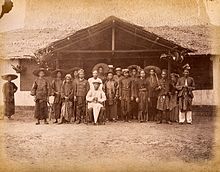Hai San Society | |
 巴生海山黨人、當地華人甲必丹及當地馬來土酋的合影,攝於1874年7月 | |
| 創建時間 | 1799年 |
|---|---|
| 創建地點 | |
| 活躍年代 | 1820年—1890年 |
| 活動範圍 | 英屬馬來亞一切華人聚集地 |
| 種族特點 | 客家人(惠州人)、廣府人(順德人、番禺人等) |
| 犯罪活動 | 售賣鴉片等毒品、陰謀、賄賂、勒索、雇傭兵 |
| 敵對組織 | 義興公司 |
海山公司,早期传说源自洪门(天地會)組織[1],主要活動在南洋,尤其在马来亚[2]。1799年在海峽殖民地的槟城正式成立以惠州客家人和顺德、番禺等广府人为主的帮派[3]。后来其实力跨到整个马来亚及新加坡。
歷史
海山地下組織的歷史可以追溯至喬治市開埠之初的1799年,19世紀马来土邦苏丹及王侯曾拉拢海山公司助战,另一方就会寻求义兴公司。所以其军事实力不容忽视。
1832年有記載馬六甲馬德拉斯輕步兵第23團的軍官(23 Regiment, Madras Light Infantry, in Malacca)托馬斯·約翰·紐博爾德(1807年—1850年)表示:
| “ | 他們自稱『公司』來招募或強迫馬來亞定居的華裔加入,慢慢累積為強大戰力的反政府組織(這裡指政府的是中國的清朝)。而當中他們在馬來亞主要通過賄賂,威脅造謠,有時甚至通過公開暴力達到其目的。甚至一些統治者甚至會招募這一些組織為傭兵或官員。 | ” |
| ——[4][5] | ||
早期馬來亞(星馬兩地)的華人私會黨的形成衆所皆知,他們本源於中國的天地會,並且與天地會有著千絲萬縷、錯綜複雜的關係。
據史載,新加坡最早發生私會黨引發的格鬥最初發生在1824年,當時的新加坡政治家萊佛士的私人秘書,著名馬來作家文西阿都拉(筆名:Munshi Abdullah,1796—1854),於1824年冒險參觀新加坡市郊天地會的入會儀式。1825年,衆多私會黨中,英殖民政府就發現了「義興」、「海山」、「合成」、「華記」四個派別。
最早私會黨總部通常設在檳榔嶼喬治市,並在馬來亞各地都有支會。其中有霹靂州拉律、雪蘭莪蘆骨(當時屬雪蘭莪)、森美蘭雙溪芙蓉、雪蘭莪巴生等地,後以雪蘭莪的吉隆坡及加影為最重要,因爲這些地區都是以錫米(Biji Timah)挖掘而吸引華人南來聚集之地。就在這個時間段,甲必丹鄭景貴開埠太平市而發生的「拉律戰爭」、甲必丹葉亞來開埠吉隆坡而發生的「雪蘭莪内戰」,都可以見到私會黨之間的械鬥,及馬來王侯爲了保身及獲得利益而拉攏華人私會黨。由此可見,在當時若是南下以采礦爲生者皆是根據自己祖籍而被「强制」加入幫會,以尋求「保護」。
與天地會
儘管新馬兩地秘密會社是在地社會的一部份,與中國天地會肯定存在異同。不過,中國天地會對東南亞秘密會黨的影響仍極其巨大,從組織結構、管理模式、到幫派禮儀、暗語、腰憑,在新馬兩地秘密會黨無不受到天地會影響。例如組織方面:
總部:
- 主帥
- 香主
- 大哥
- 二哥
分部:
- 總理
- 先生
- 先鋒
- 紅棍
- 管花(包括才富)
- 鐵板草鞋
早期的義興公司現稱「老義興」(洪門正二房洪順堂人),海山公司現稱「老海山」(洪門正三房家後堂人)的組織有白扇先生、紅棍以及草鞋等幾個等級。白扇在組織里的地位最高,主持開壇儀式。海山派客家私會黨屬於「天合會」(也許是取自天地會與三合會),在新加坡的總部設在海山街(克羅士街上段,Upper Cross Street),打着「海山公司」(Hai San Kongsi) 四個大字招牌。當時還有其他的大型私會黨包括福建幫義福、客家幫洪家等,幫派間的利益衝突與暴力械鬥,就這樣從18世紀末葉延續至20世紀初的兩個世紀。
參考資料
- ^ Encyclopædia Britannica
- ^ Triad Societies: Western Accounts of the History, Sociology and Linguistics of Chinese Secret Societies By Kingsley Bolton, Gustaaf Schlegel, Herbert Allen Giles, Christopher Hutton, J. S. M. Ward, Mervyn Llewelyn Wynne, W. P. Morgan, William Stanton, W. G. Stirling; Contributor Kingsley Bolton, Chris Hutton; Published by Taylor & Francis, 2000; ISBN 0-415-24397-1, ISBN 978-0-415-24397-1
- ^ Straits Settlements Factory Records Vol 101 (1825) Page 1476-1480 and 1604
- ^
“ The secret fraternities in which they (the Chinese settlers) enroll themselves for mutual protection and support, prove powerful engines for political combinations, as the Dutch have repeatedly experienced during their long administration in Java and in the Malay States. In China itself, these societies are deemed so dangerous to the Government as to be interdicted under penalty of death. At Pinang in 1799, they set the administration in defiance and strong measures were necessary to reduce them to obedience. Even in the present-day, the ends of justice are frequently defeated both at Pinang, Malacca, and Singapore: by bribery, false swearing, and sometimes by open violence, owing to combinations of these fraternities, formed for the purpose of screening guilty members from detection and punishment. In European Settlements, they are under the general control of an officer, or headman styled "Capitan", who receives a salary from the Government and is responsible in some measure, for the orderly conduct of his countrymen, whose representative and official organ he is. Their interior affairs, disputes, and private interests are arranged by the heads of their respective "Kongsis" or fraternities.
” ——Thomas John Newbold (1807–1850), an officer in the 23 Regiment, Madras Light Infantry, in Malacca - ^ Political and Statistical Account of the British Settlements in the Straits of Malacca, Viz: Pinang, Malacca, and Singapore By Thomas John Newbold, Published by J. Murray, 1839, Pages 13-14








